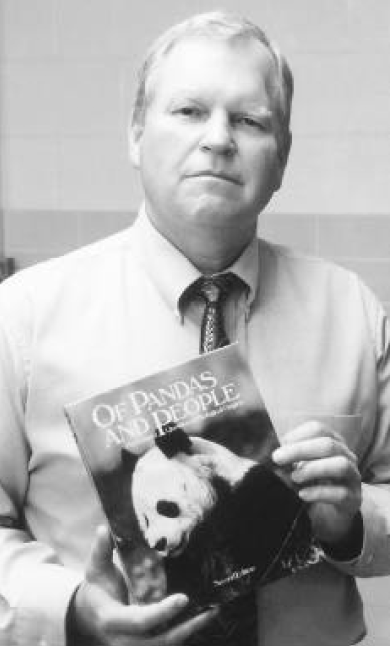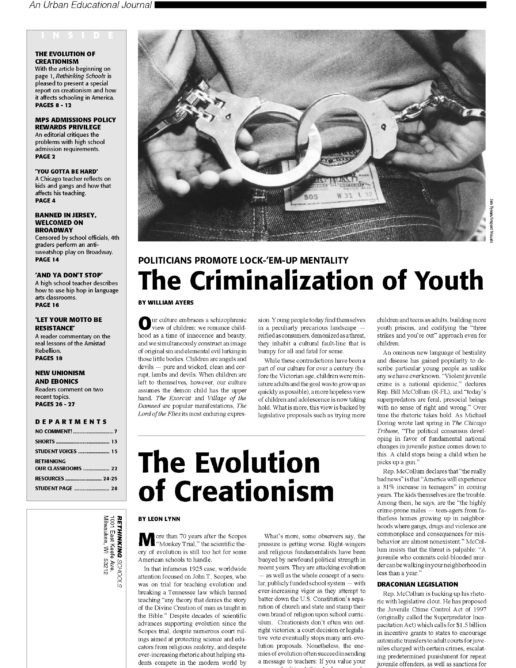Creationists Push Pseudo-Science Text

With its glossy cover, full-color illustrations, and chapter titles like “Homology” and “Genetics and Macroevolution,” “Of Pandas and People” sure looks like a science textbook, and a classy one at that.
But get past the flashy packaging and start digging into the text, and it soon becomes clear that it’s not. “Of Pandas and People” is a creationist treatise dressed up to look like a legitimate discussion of science.
“Pandas” is published by a group called the Foundation for Thought and Ethics, based in the Dallas suburb of Richardson. Advocates of creationism have tried to get “Pandas” adopted as a state textbook in Idaho, Alabama, and Texas, and pro-creationism school board members have sought its local adoption in numerous school districts, including Vista, CA and Louisville, OH (See the related article on Louisville in this issue). Conservative groups such as Concerned Women for America and Citizens for Excellence in Education have championed “Pandas,” portraying it as a factual scientific analysis that tears gaping holes in the theory of evolution.
“Pandas” claims to offer evidence for the so-called “theory of intelligent design.” Simply put, “intelligent design” is the belief that life is so complex and remarkable that it could not have developed without an intelligent, purposeful guiding hand. According to the book:
When we find “John loves Mary” written in the sand, we assume it resulted from an intelligent cause. Experience is the basis for science as well. When we find a complex message coded into the nucleus of a cell, it is reasonable to draw the same conclusion. … To say that DNA and protein arose by natural causes, as chemical evolution does, is to say complex, coded messages arose by natural causes. It is akin to saying “John loves Mary” arose from the action of the waves, or from the interaction of the grains of sand. It is like saying the painting of a sunset arose spontaneously from the atoms in the paint and canvas.
The identity of the “designer” is never specifically discussed, thus providing creationists with grounds to claim, however transparently, that “Pandas” isn’t arguing for the existence of God or promoting a religious view. The 170-page book claims to present data from different scientific disciplines which discredit evolution and support the “scientific rationale” behind intelligent design. Page after page of professionally prepared charts and illustrations appear to show how concrete scientific evidence supports the existence of the unnamed “designer.”
The emphasis is on presenting intelligent design as a legitimate scientific theory, one that’s at least as credible as the theory of evolution. Readers, presumably students, are told in the book’s introduction that if they don’t read “Pandas,” they will “miss a lot of interesting science.” The introduction also says that the authors hope readers “finish this book respecting good scientists of all persuasions; we do.”
“Worthless and Dishonest”
A lot of good scientists, however, don’t have any respect for “Of Pandas and People.” Michael Ruse, a professor of philosophy and zoology at the University of Guelph in Ontario, Canada, termed the book “worthless and dishonest” in a 1989 review. Kevin Padian, a paleontologist at the University of California-Berkeley and one of the authors of the science framework for California’s schools, called “Pandas” no less than “a wholesale distortion of modern biology.” He said: “It is hard to say what is worst in this book: the misconceptions of its sub-text, the intolerance for honest science, or the incompetence with which science is presented. In any case, teachers should be warned against using this book.”
Gerald R. Skoog, an education professor at Texas Tech University, a former biology, teacher and a past president of the National Science Teachers Association, has a similarly low opinion of “Pandas,” saying; “It’s just not science.” Even if you gloss over inaccuracies and misrepresentations of scientific theory in Pandas, he says, “the claim that life is the result of intelligent design can’t be tested by scientific means, and it has no power to explain the natural world.”
While “Pandas” claims to be a science book, it’s really a political tool, says Raymond Vasvari, a lawyer in Ohio who works with the American Civil Liberties Union and who has been involved in issues involving creationism. “I call ‘Of Pandas and People’ the intellectual Trojan horse of the religious right,” Vasvari says. “It looks and feels and acts like a science textbook, but it’s not. It’s a message aimed at the seventh-grader who doesn’t know science or understand the controversy over evolution and creationism.”

